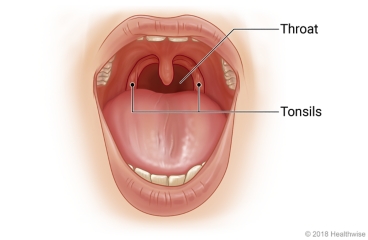Throat Culture: About This Test
What is it?

A throat culture is a test to find a bacterial or fungal infection in the throat.
Why is this test done?
A throat culture may be done to:
-
Find the cause of a sore throat. Most sore throat infections are caused by a virus. A throat culture shows
the difference between a bacterial infection and a viral infection. This can help guide treatment.
-
Check a person who may not have any symptoms of infection but who carries bacteria that can spread to
others. This person is called a carrier.
How do you prepare for the test?
-
In general, there's nothing you have to do before this test, unless your doctor tells you to.
-
Tell your doctor if you have recently taken any antibiotics.
How is the test done?
-
You will be asked to tilt your head back and open your mouth as wide as you can.
-
Your doctor will press your tongue down with a flat stick (tongue depressor) and then examine your mouth
and throat.
-
A clean cotton swab will be rubbed over the back of your throat, around your tonsils, and over any red
areas or sores to collect a sample.
-
The sample may also be collected using a throat washout. For this test, you will gargle a small amount of
salt water and then spit the fluid into a clean cup. This method gives a larger sample than a throat swab.
It may make the culture more reliable.
How long does the test take?
The test will take less than a minute.
What happens after the test?
-
Results for a rapid strep test are available in 10 to 15 minutes. This test is only for bacterial
infections caused by strep bacteria. This is the most common type of throat culture.
-
Other throat culture test results for bacterial infections are ready in 1 to 2 days, depending on which
bacteria are being tested for. Test results for a fungus may take about 7 days.
When should you call for help?
Call your doctor now or seek immediate medical care if:
-
You have a new or higher fever
-
You have a fever with a stiff neck or severe headache.
-
You have new or worse trouble swallowing.
-
Your sore throat gets much worse on one side.
Watch closely for changes in your health, and be sure to contact your doctor if:
Follow-up care is a key part of your treatment and safety. Be sure to make and go to all
appointments, and call your doctor if you are having problems. It's also a good idea to keep a list of the
medicines you take. Ask your doctor when you can expect to have your test results.
Current as of: May 13, 2023
Content Version: 14.0
Care instructions adapted under license by your
healthcare professional. If you have questions about a medical condition or this instruction, always ask
your healthcare professional. Healthwise, Incorporated disclaims any warranty or liability for your use of
this information.